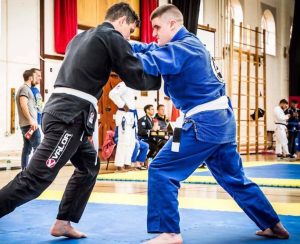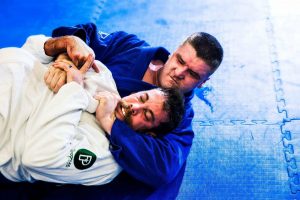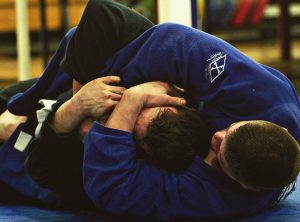“I don’t feel blind when I’m on the mat”: the remarkable story of Rob Long – the Afghanistan veteran with an incredible jiu-jitsu dream
In a month’s time, Rob Long will head to Aldershot, where he will be looking to retain the Brazilian jiu-jitsu title he won back in 2017. However, this is no ordinary jiu-jitsu tournament, and Rob Long is no ordinary man.
On 8th July 2010, Long was injured in Afghanistan while serving with the 473 Special Observation Battery Unit of the Royal Artillery. He lost both his eyes – one on the battlefield, the other in hospital after being flown back to England. He has no sight at all.
Yet, as we talk nearly eight years on from the day that could so easily have taken his life, Long speaks with a remarkable courage of his past and with a stirring determination of his future.
“Nobody knows how strong they are until strength is your only option,” he reflects with the maturity of a man whose resolve has been tested more than most could ever fathom. Long spent four years relearning how to live independently.
“There was no other option. I could either be strong and get through it and be an adult man and take it on the chin and get on with life, or I could wither away and fade into the darkness and be miserable. It’s difficult to describe but if someone had told me I was going to go blind, I’d be terrified; I’d be hating it and dreading it.
“But I’m blind. I’ve got to face it. There’s no ‘woe is me’. I’ve just got to get on with my life as best as I can. My friends died out in Afghanistan and I was lucky enough to make it back. Life is still there to be lived and I’m going to make the most out of it and live the life that I’m fortunate to have.”
And as he prepares to defend his crown in Aldershot, where he beat a field of able-bodied and fully-sighted athletes in October, there is no doubt that Long has stayed true to his word.
“Obviously, I wasn’t going to be a soldier anymore,” he makes clear as he explains his route into jiu-jitsu.
“But I still had that high level of fitness and high level of motivation and I was looking for something to do. I had that chip on my shoulder – I was still a young man, I didn’t want to just give up and melt away.
“I ended up signing up to do the London Marathon in 2012 and I ran it. I hate running. Running just isn’t my thing, it’s not really my sport. But obviously, by running it, I’d accomplished that and achieved my goal. I wasn’t passionate about it but I did it. It was that little piece of the puzzle that helped to bring my self-esteem back.”

From there, his arrival in the world of Brazilian martial arts was, he admits, partially coincidental and partly thanks to his girlfriend.
“I never really thought about martial arts. I had this heavy-bag in my house and I used to use it all the time just to take my frustration out on it.
“My girlfriend is a kickboxer and she has been for years and years. For Valentine’s Day a few years ago, I went down to her kickboxing academy and I was talking to the guys there and explaining who I was, and I said that I used to do a bit of boxing and they just said: ‘If you ever fancy coming down and training, we’d happily take you on’.”
However, unable to see his opponent, kickboxing was never a viable option beyond acting as an intense training mechanism. Brazilian jiu-jitsu, on the other hand, was perfect.
A Japanese martial art focused on grappling and forcing victory by pinning rather than striking the opponent, Long views ‘BJJ’ as the ideal sport for blind people. Indeed, his gold medal against sighted opponents at the Army Championships came just six months after beginning training with the squad.
“I don’t know if it’s because of my background as a soldier but I’ve never wanted to blindfold people,” he says of any perceived hindrance.
“I want to fight against anyone, wherever the best competition is – whether they have another disability or whether they’re able-bodied. I’ll go wherever the best fight is, I’ll train myself to that level and BJJ is perfect for that. Obviously, due to it being heavily based on ground-based fighting, as soon as someone is in my grips, there’s no disadvantage.”
“It’s tactile and I can feel when and where his body is moving. It’s too quick as a sport to stop to look at where they’re moving.
“Obviously, you’re probably more comfortable if you’ve got your sight and there are probably slight advantages but not really that make any difference.”
Simply, he says with the steel of a man driven by sheer willpower, he will not be taken lightly. To underestimate Long on the mat would be to disrespect a journey that defies logic in itself – the recovery, the self-motivation to overcome the most life-afflicting injuries, the desire to compete once again on a level playing field.
“People don’t give me leeway because I’m blind because, if they did that, they know that I’d be choking them or snapping their arm.
“You come onto the mat and the outside world disappears. It’s just you and the other guy and a medal at the end of it. That’s what it’s all about for me.
“I don’t feel blind when I’m on the mat. There’s no obstacles. The only things on that mat are me and the other person. I’ve got a job to do.”
As Long speaks, it is impossible not to be struck by the military grounding that he underwent before his world changed aged just 23. Loyalty, integrity, courage, discipline and respect – the pillars of British Army values – guide every part of his story and they are etched on his personality.

Even his successful London marathon run had its roots in a burning desire to be treated as the fit young man who had served his country with distinction – to be noticed for what he has rather than what he lacks.
“At the time, I didn’t want anyone to say: ‘poor blind man’ or anything like that,” he stresses.
“I wanted to do something that able-bodied people would be hesitant to do and I wanted to smash it. I had that drive in me that I did not want to just be known as this disabled guy that people look at, walking down the street with his white cane and feel sorry for. I wanted to go out and do whatever I could. It is a little bit of a chip on my shoulder and I needed to get over that.
“Completing the marathon did do that and it gave me some self-worth in a sense. But sport is enjoyable, and sport is great. The psychological aspects of sport are great in terms of getting out of your comfort zone. When you’re in those uncomfortable moments, after you’ve achieved something, the feeling is amazing, it’s absolutely phenomenal. It does so much for your mental health.”
Indeed, Long’s gold medal at the Army Championships was one such moment, having originally entered the competition on little more than a whim. It has turned what was merely an exploratory journey of human psychological toughness into a full-time career.
And typically for a man steadfast in overcoming life’s obstacles, there is only one objective now.
“I just know that I want to be the best in the world at Brazilian jiu-jitsu,” he tells me.
And although jiu-jitsu is not alone in the mixed martial art world in offering competitors the grappling characteristics that Long highlights as crucial to his own situation, the former soldier has no intention of adapting his skill-set to another discipline. Despite being the youngest of the combat sports offered by the Army, it is by far and away the most popular.
“I tend to avoid striking sports like boxing and kickboxing and things like that anymore,” Long explains.
“After being hit by a bomb to the head, I really don’t need any more strikes to the head, especially with the things that are being discovered in terms of concussion injuries.”
That Long can speak so rationally of circumstances that are simply unfathomable to so many of us, reinforces the mental fortitude of the man – both as soldier and, now, as athlete.
I ask Long if he thinks the 23-year-old serviceman of 2010 would be able to comprehend the extraordinary attitude to life that his 30-year-old self has been forced to take on.
As he often does throughout our chat, he pauses for a moment to give himself time to think. Every response is reasoned, every word is thoughtful and every candid explanation of how life has changed is draped in supreme maturity. This time, a sigh follows the pause – but there is not a tinge of regret, not a hint of self-pity.
“I knew the risk I was taking as a soldier. We had a major war in Iraq going on and we had a major war in Afghanistan going on. At the time that I was sent out to Afghanistan, during that period we were having roughly two British soldiers dying every few days.
“When I first got to Camp Bastion when I arrived, they didn’t really have a large area for us. We were in one of the large tents round by where the emergency and response teams were flying back in wounded and dead guys. Those flights were happening all day every day, it really was a war-zone. I knew what I was stepping into.
“You can’t really focus on it when you’re out there, you’ve got your job to do like anything else. You just have to focus on your job or you’d become a wreck. You put it to the back of your mind and when these obstacles come, you adapt and overcome. And that’s part of the ethos of the British army. You adapt and overcome when obstacles and challenges come your way. You don’t just turn your back and melt into the woodwork. You have to take it on. There’s no other option.
“I could never see another option of lying down and dying. I love life. I really love life. I’m not saying it’s not hard and I’m not saying it’s not difficult. There are some really dark days. But at the end of the day, everyone’s got their struggles. Nobody knows why we’re here so let’s just take our lives and enjoy it while we can and take the goodness and passion that we can get out of life and roll with it.”

As an approach to life, there can be few better and there can be few more inspiring. The dream, he says, is Invictus – the competition fronted by Prince Harry and providing an athletic platform for veterans worldwide to show the world – and themselves – that they will not be defined by their injuries.
At present, however, neither the Invictus Games nor the Paralympics feature Brazilian jiu-jitsu. It’s a situation that – for Long – should change, not least because the sport clings to the wrestling roots of ancient Olympism.
“That’s something I’d love to push towards,” he confesses. “I think the Invictus Games are screaming out for a sport like this. When you look back at the history of the Olympics, they had grappling and wrestling and that was the big show – the epitome – in the old Athens arenas.
“It’s something that I’d like to raise and take to them and show them that in a controlled environment with disabled veterans, this is a beautiful sport and is something that could really inspire people and bring people together.”
Whether or not the Games’ organisers share his viewpoint, Long remains an ardent fan of all that Invictus has accomplished for the perception of war veterans.
“I think in terms of veteran mental health and wellbeing and having something to aspire to, it’s hugely important,” he explains.
“To have the public support and to have so much public admiration for getting up and rising again and representing our country again internationally, it’s hugely beneficial to veterans and hugely important to how our country looks internationally.”
Quite how much time Long has at the sport’s top table, he admits, is uncertain – he believes he may have six or seven years before rapid improvement is replaced by a gradual slowing of reactions.
He trains under the tutelage of Roger Gracie, the Brazilian-born ten-time world champion, who runs an academy in London. Gracie is 36 and still competes with the world’s best.
What Long achieves as he enters his athletic peak is unquantifiable. Having already claimed the least likely of gold medals, the potential is clearly there. Ultimately though, what happens next should not matter because of what has come before. Simply being here and rediscovering a sense of purpose is surely the greatest victory in the story of this remarkable man?
Yet, as our conversation comes to a close – Long, predictably, has a training session to head to – he signs off with one final statement of his insatiable and infectious desire to achieve the incredible.
“I didn’t join the British Army because I wasn’t ambitious,” he explains pensively. “I tried to join the most elite unit I could outside the special forces. It wasn’t a special forces unit or anything like that, but it was a hard unit to get into and is very prestigious.
“I had a lot of things that I wanted to achieve in the British Army, but those plans blew up in my face. But like I said before, in terms of adapting and overcoming, I still have that ambition. No bomb is going to take that away from me and nor is having no sight.
“I’m not going to let anyone rob me of my ambition. Whatever state I’m in, I’m still going to try and achieve as much as I can with my potential. I know what my potential is and I’m going to fight for it and I’m going to fight to achieve my goals and dreams and I wouldn’t let anyone or anything rob me of that. I’m still here, you know.
“While I’m alive, I’m going to do my best to be successful and achieve what I can.”